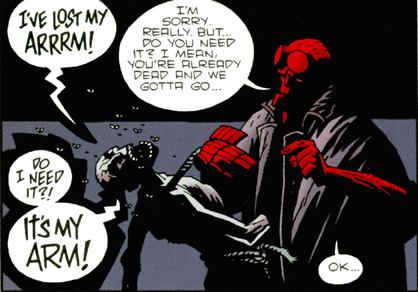

| August 2004 |
|
| Mike Mignola : Hellboy | |
 For once, the movies get it right: Guillermo del Toro's film
pretty much captures the character and atmosphere of the
comic.
For once, the movies get it right: Guillermo del Toro's film
pretty much captures the character and atmosphere of the
comic.
At the end of World War Two, a desperate team of Nazis, led by the Russian mystic Rasputin (an aristocratic clique tried hard to kill him in 1916, but apparently didn't try hard enough) hopes to summon a demon from Hell. They succeed, but he's merely an infant demon, and he falls into the hands of kindly GIs, who name him Hellboy.
Hellboy is raised by the government, and becomes the chief weapon against a wide array of paranormal threats. Many of these relate to Rasputin's ongoing project: unleash the ogdru jahad, the Seven Beasts who (with a heavy nod to H.P. Lovecraft) plan to destroy humanity and replace them with monsters. Hellboy was a key part in this plan, and demons and witches keep trying to talk him back into it. "Get stuffed!" is his eloquent response.
Mignola has a sprightly stylized line, which works surprisingly well for drawing tentacled apparitions of great evil; and his colorist, Dave Stewart, chooses darkish but saturated colors that complement them well. As a balance to the frequent horrors, there are restful displays of ancient statuary.
There are five TPBs out and I read them all at once-- which I don't really recommend; it brings out a certain repetititveness in the material. Hellboy meets some supernatural horror, it taunts him for not following his destiny, and he beats it up. I think the best volumes are the first (Seed of Destruction) and the fourth, The Right Hand of Doom, which features one of the best done of the stories, "Box Full of Evil", and the funniest, "Pancakes".
| Eddie Campbell : Bacchus | |
 Truth in advertising: this comic is indeed about Bacchus, the god of wine, still alive after 4000 years but much the worse for wear.
Truth in advertising: this comic is indeed about Bacchus, the god of wine, still alive after 4000 years but much the worse for wear.
The series is best when Campbell takes the opportunity to retell old myths-- which he also extends over the next thousand years or so, telling how most of the gods of Olympus were murdered in their dotage by a nonentity-- a grandson of Argus the Hundred-Eyed, with only twenty eyes-- leaving the rest to make their way as best they could in a changing world. Theseus, for instance, has become a crime boss, while Bacchus mostly wanders about looking for free drinks (wine only, please).
It's a good deal more scattershot when it follows Bacchus around the modern world-- doing the Greek Islands, listening to pointless stories in English pubs, getting tossed in jail. You never know quite where this comic is going to go-- something I appreciate in comics-- though you can generally count on things going awry for everyone involved, from Greek gods to ambitious mortals to idle bystanders.
Campbell has a loose, sketchy line which sometimes serves him beautifully, sometimes remains a little too sketchy. (On some books he's assisted by other artists.)
Of the books I've read, I'd recommend book 1, Immortality Isn't Forever, which introduces Bacchus and his age-old quarrel with "Joe" Theseus and tells the story of the overthrow of Olympus; book 5, Earth, Water, Air & Fire, where the gods get caught up in a gang war; and book 3, Doing the islands with Bacchus, typical of the quieter books, where Bacchus wanders old haunts and tells some whoppers.
